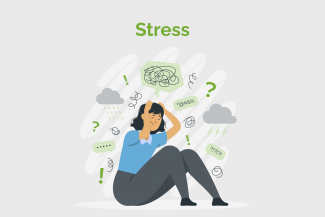Stress is what happens when you have too much to handle. The body goes into fight or flight mode. Your heart rate may go up and you may breathe faster or sweat more. This response is fine within normal limits. But beyond that, it can be harmful.
Stress is a global issue and increases with Age.

What causes stress
Stress is caused by changes in your environment, be it the home or the workplace, or life-altering events like bereavement, illness, financial worries or divorce. The severity of the condition varies for each person, depending on his/her innate strength to face a particular problem.
Are you at a risk of developing stress
These factors heighten risk, for example:
- Childhood experiences, such as abusive behaviour, have long-term effects on the hypothalamus-pituitary system, which is the main stress-regulating centre. These experiences leave an impact on a person’s feeling of safety and security, making them more prone to stress.
- Emotional instability: Some people are more easily overwhelmed by stressful events.
- Anger issues – if you tend to get angry easily, you may experience more stress than others.
- People whose immunity response is less efficient (hence prone to infections) may be more prone to stress. Stress also causes low immunity.
- Age – With age the systems in the brain that respond to stress become inefficient. This may be due to medical issues, loss of spouse or friends, financial issues etc.
- Working women have more stress because of the workload at home and the work place.
- Divorced men/women are at higher risk as their family life is affected.
Changed
02/Jun/2017
Community
Condition









